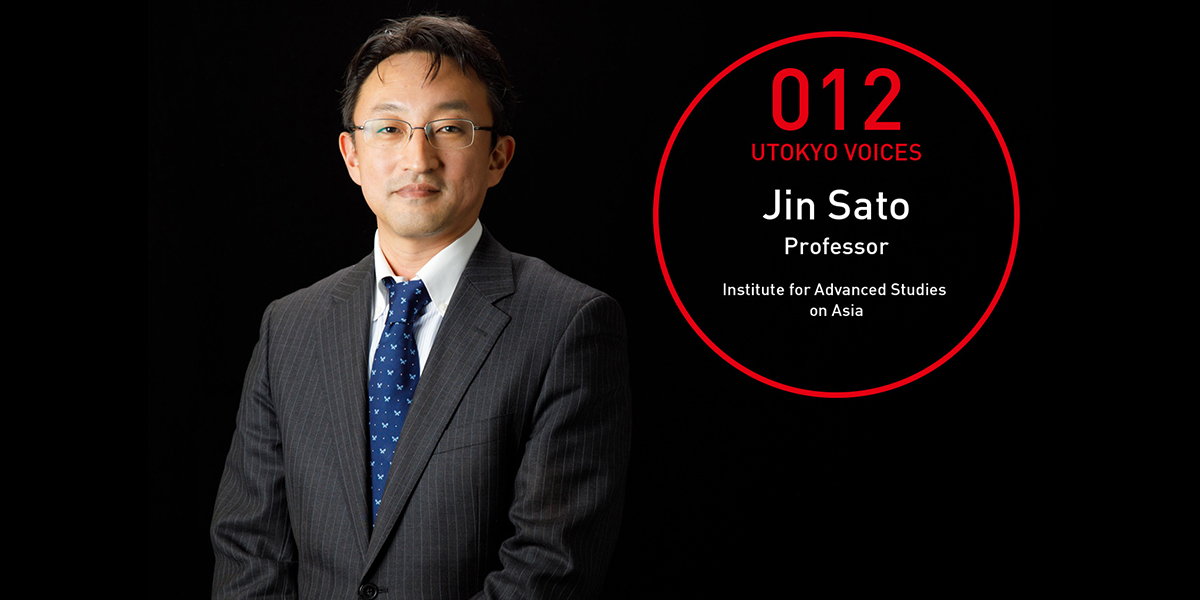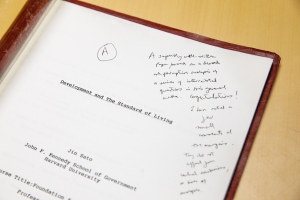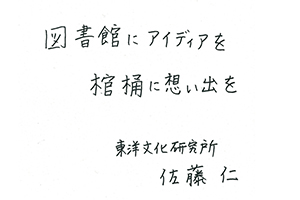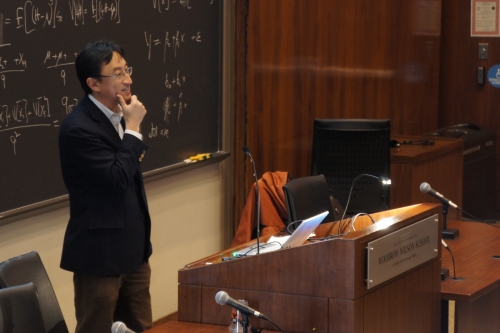The Possibilities of Resources | UTOKYO VOICES 012


The Possibilities of Resources
Thanks to his father’s job as a Ministry of Education bureaucrat, Jin Sato spent his childhood in a number of exotic places, including Nigeria, Thailand, and France, no doubt opening his eyes to the diversity of the world. In his graduation essay from the Japanese Primary School in Paris, the young Jin wrote, “I want to become a diplomat.”
He later returned to Japan, but then spent several months in New York State as an exchange student, where he experienced culture shock adapting to American high school life. There was a clear class structure, based on race and ability. This was the first time he felt issues with being Asian and was why he started wondering, “in a world where you get left behind if you don't constantly work to promote yourself, which field should I choose to work in?”
As a student at the College of Arts and Sciences of the University of Tokyo, he wanted to research international development, hoping to be able to assist developing countries. As a graduate student, he spent two years in Thailand doing fieldwork, researching the politics of forest preservation in a remote village. This made him feel at home in Asia.
He then came up with his main research topic: “how does resource management transform into human management?” This topic, focused on Southeast Asia, had him grappling with the issue of resources. Looking into the history of resources theory in Japan, he rediscovered the concept that “resources are possibilities,” which became the foundation for his research.
As Sato says, “Resources are possibilities, and how they are used is determined by people. It’s important to see beyond the resources lying right in front of you. So I need to be free enough to take a broad, bird’s-eye-view of the entire process, both upstream and downstream.” Sato habitually tries to track something he finds interesting back to its origin, to where it all began. This sort of digging deep makes for the odd sensation of feeling that all themes are linked through their foundations, as if he is venturing into the field of history. “People might think that what I’m doing now and what I was doing then are completely separate, but that’s not the case at all.” He has also had a long-standing interest in education, and hopes his regular lectures will be “classes students remember.” He feels that “the issue of what constitutes a good education system may well be a background theme to my life.”
Over the last few years, he has spent four months each year as a visiting professor at Princeton University, and has compiled his experiences there into a book, What I Learned Teaching at America’s Top School (Kadokawa Shinsho). In 2010, he took a sabbatical and went to the States. His children expressed a wish to go to school there, so he looked for a job locally, which is what led to the way he lives his life now. Sato thinks of this double life, in Japan and the United States, as “in a sense, something that changed my life.” With a laugh, he notes that “my life seems to have been ruled by serendipity.” He modestly adds that “I can’t claim at all that I forged my own path, however.”
“You should do something you find interesting, something worth leaving as an idea. In this sense, I’m lucky being able to manage it.” He is not clinging to his current status, however, saying, “I don’t know how long I’ll be doing this.” Reaching fifty, a milestone in life, he says he’s already decided on his next research theme, but as to after that, “I want to try something more real.” We wonder what possibilities lie waiting in the stage Sato chooses next.


This is Sato’s May 1993 report on “Development and The Standard of Living” written during his time as a graduate student at Harvard University. Amartya Sen, who later became the first Asian recipient of the Nobel Memorial Prize in Economic Sciences, gave him an “A.” “I was really glad to get this, because the reason I went to Harvard was to take his classes,” Sato says.


Toshokan ni Idea wo / Kanoke ni Omoide wo (“Leave your ideas in the library and your memories in your coffin”): Sato uses these words as a precept to remind him not to bother with things like status and fame that have no place either in the library or the coffin.

Jin Sato
After graduating from the Department of Humanities and Social Sciences at the University of Tokyo in 1992, Sato studied at the John F. Kennedy School of Government at Harvard University, getting his Master’s degree in 1994. In 1995, he obtained his Ph.D. from the Graduate School of Arts and Sciences at the University of Tokyo. He served as Associate Professor of the Graduate School of Frontier Sciences, then Associate Professor at the University of Tokyo’s Institute for Advanced Studies on Asia, then Visiting Associate Professor at Princeton University’s Department of East Asian Studies. He is currently Professor at the University of Tokyo’s Institute for Advanced Studies on Asia, and a Global Scholar at Princeton’s Woodrow Wilson School of Public and International Affairs. His main publications include Development Theory for Making It through Barbarism (Minerva Shobo) and Resource Theory for "Have-Not" Nations (University of Tokyo Press). He is recipient of the 10th Japan Academy Medal and the 21st Okita Memorial Prize for International Development Research, among others.
*The profile photo shows Sato teaching at Princeton (supplied by Sato).
Interview date: December 4, 2017
Interview/text: Yukiko Kato. Photos (top picture and Maxim): Takuma Imamura.






